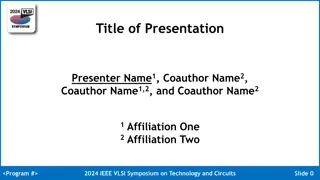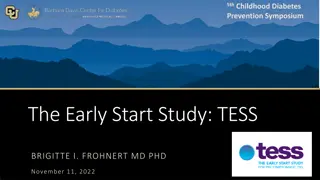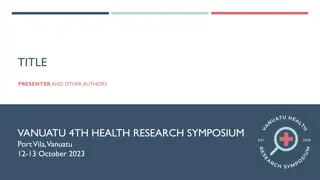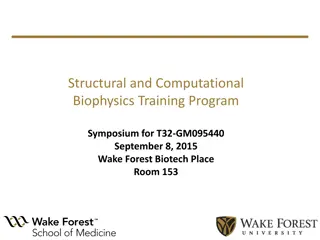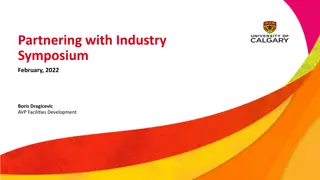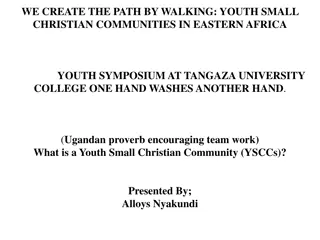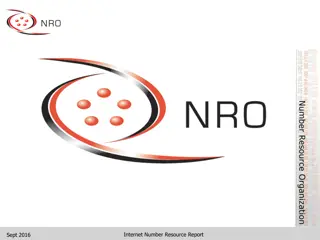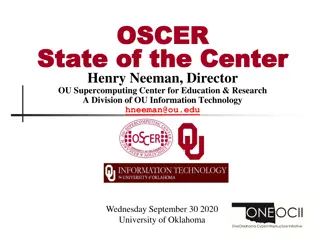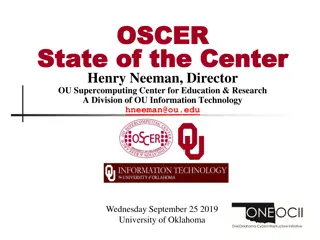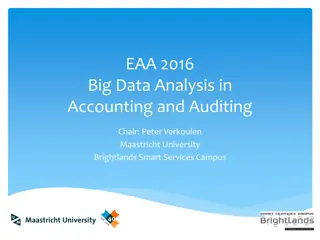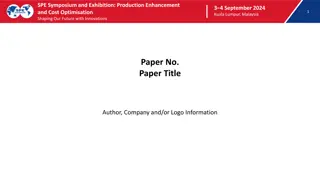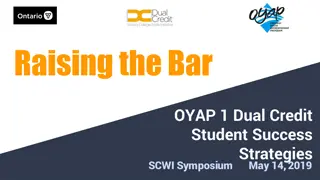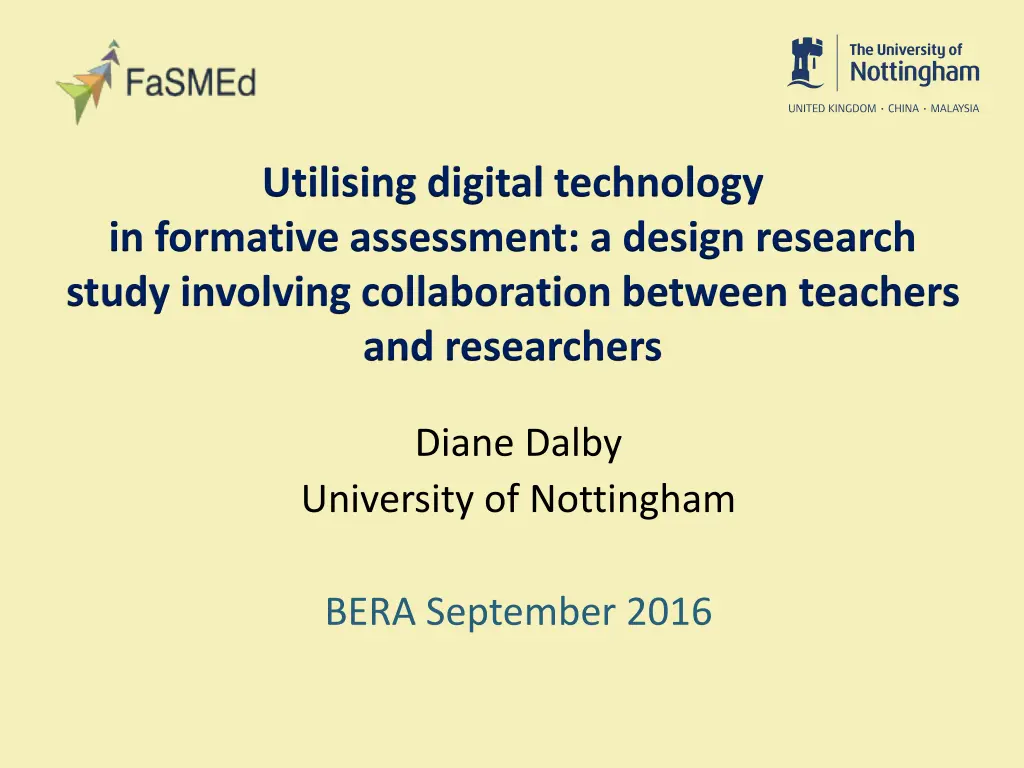
Enhancing Formative Assessment through Digital Technology in Education
Explore a design research study on utilizing digital technology for formative assessment in collaboration between teachers and researchers. Learn about the FaSMEd project focusing on formative assessment in science and mathematics education. Discover how iPads are used to enhance formative assessment processes in mathematics lessons. Dive into the practice of formative assessment in classrooms and its impact on student achievement.
Download Presentation

Please find below an Image/Link to download the presentation.
The content on the website is provided AS IS for your information and personal use only. It may not be sold, licensed, or shared on other websites without obtaining consent from the author. If you encounter any issues during the download, it is possible that the publisher has removed the file from their server.
You are allowed to download the files provided on this website for personal or commercial use, subject to the condition that they are used lawfully. All files are the property of their respective owners.
The content on the website is provided AS IS for your information and personal use only. It may not be sold, licensed, or shared on other websites without obtaining consent from the author.
E N D
Presentation Transcript
Utilising digital technology in formative assessment: a design research study involving collaboration between teachers and researchers Diane Dalby University of Nottingham BERA September 2016
The FaSMEd project FaSMEd Formative Assessment in Science and Mathematics Education is a European (EU funded) project involving 9 partners in 8 countries. Aims To foster high quality interactions in international classrooms that are instrumental in raising achievement for low achievers; To expand our knowledge of technologically enhanced teaching and assessment methods addressing low achievement in mathematics and science.
Local focus The UoN research focus was on the use of iPads in mathematics lessons and how they could be used to facilitate or enhance formative assessment processes. Three schools with three teachers in each, working in partnership with the UoN team; Each school involved in designing and trialling either two or three lessons; Interviews and observations used to explore research questions and develop case studies.
Formative assessment Practice in a classroom is formative to the extent that evidence about student achievement is elicited, interpreted and used by teachers, learners, or their peers, to make decisions about the next steps in instruction that are likely to be better, or better founded, than the decisions they would have taken in the absence of the evidence that was elicited. (Black & Wiliam, 2009)
Where the learner is going Where the learner is right now How to get there A. Clarifying learning intentions and criteria for success B. Engineering effective classroom discussions and other learning tasks that elicit evidence of student understanding C. Providing feedback that moves learners forward TEACHER D. Understanding (shared) learning intentions and criteria for success E. Activating students as instructional resources for one another PEER D. Understanding learning intentions and criteria for success E. Activating students as the owners of their own learning LEARNER
Project strands Three interlinked elements: the design of lessons (that included some use of digital technology in a formative assessment process); the exploration of specific research questions; the professional development of the participating teachers.
Lesson design An adapted design research approach with: A cyclical process of design, testing, feedback, reflection and redesign. (Gravemeijer and Cobb, 2006) Trials and observations of the learning phenomena in real situations. (Collins et al., 2004) A fusion of research and practice. (Burkhardt and Schoenfeld, 2003)
The design cycle A cycle of lesson planning involving collaboration, observation, reflection and feedback into the next lesson. Collaborative planning Feedback Reflection Implementation Observation
Characteristics of the design process Collaboration between teachers and researchers in lesson designs. Knowledge-sharing between teachers and researchers became essential since each had specific knowledge of value. Experimentation with uses of technology rather than a refined design product.
The research questions The questions How do teachers obtain, process and present formative assessment data from students using digital technology? How do teachers inform and adapt their future teaching using such data? The research approach Lessons designed collaboratively but trials in classrooms by teachers. Observations, video and analysis carried out by the research team.
The professional development Teachers worked in trios within their schools as small professional learning communities. Professional practice involves know-how rather than know-that . (Winch, 2013) Three types of knowledge may be involved in professional development: Knowledge for practice Knowledge in practice Knowledge of practice. (Cochran-Smith and Lytle, 2001; Dana and Yendol-Hoppey, 2008)
Teacher-researcher comparisons University research Teacher inquiry PURPOSE Advance a field Improve classroom practice FOCUS Control/Prediction/ Impact/Explanation Provide insight into teaching OWNERSHIP Outsider Insider IMPACT Broad Local From Dana and Yendol-Hoppey (2008)
Comparisons from the study PURPOSE: A shared aim to produce lessons where iPads enhanced formative assessment processes. For teachers, this was to make improvements in professional practice. For researchers this was to explore the research questions. FOCUS: Teachers primarily focused on the lessons. Researchers focused on analysis, interpretation and explanation of processes. OWNERSHIP: Shared ownership of the lesson designs. Researcher ownership of the research questions. Teacher ownership of their professional development journeys.
Teacher development in the study Knowledge in practice was developed through involvement in the design and trials of lessons; Opportunities to develop knowledge of practice were less frequent since teachers had little involvement in the analysis, although critical self reflection was encouraged. Teachers levels of technical knowledge determined the positioning of individual teachers in their professional learning communities and influenced their professional development journeys.
Thank you! diane.dalby@nottingham.ac.uk

